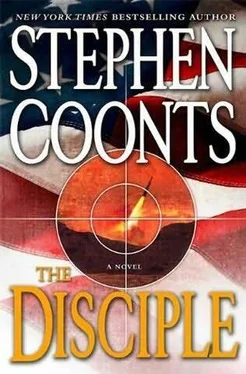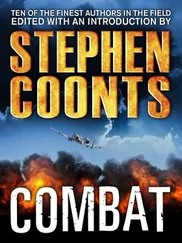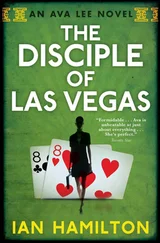Stephen Coonts - The Disciple
Здесь есть возможность читать онлайн «Stephen Coonts - The Disciple» весь текст электронной книги совершенно бесплатно (целиком полную версию без сокращений). В некоторых случаях можно слушать аудио, скачать через торрент в формате fb2 и присутствует краткое содержание. Жанр: Триллер, на английском языке. Описание произведения, (предисловие) а так же отзывы посетителей доступны на портале библиотеки ЛибКат.
- Название:The Disciple
- Автор:
- Жанр:
- Год:неизвестен
- ISBN:нет данных
- Рейтинг книги:4 / 5. Голосов: 1
-
Избранное:Добавить в избранное
- Отзывы:
-
Ваша оценка:
- 80
- 1
- 2
- 3
- 4
- 5
The Disciple: краткое содержание, описание и аннотация
Предлагаем к чтению аннотацию, описание, краткое содержание или предисловие (зависит от того, что написал сам автор книги «The Disciple»). Если вы не нашли необходимую информацию о книге — напишите в комментариях, мы постараемся отыскать её.
The Disciple — читать онлайн бесплатно полную книгу (весь текст) целиком
Ниже представлен текст книги, разбитый по страницам. Система сохранения места последней прочитанной страницы, позволяет с удобством читать онлайн бесплатно книгу «The Disciple», без необходимости каждый раз заново искать на чём Вы остановились. Поставьте закладку, и сможете в любой момент перейти на страницу, на которой закончили чтение.
Интервал:
Закладка:
After handshakes all around, Herman grabbed his wife’s arm and escaped the presence of Mustafa Abtahi.
“Are you nuts?” he demanded when they were safely away and marching along the sidewalk. “That guy might be bin Laden’s brother-in-law.”
“My mother’s father came to America from Slovakia when he was twenty-three years old,” Suzanne said, “without a dollar in his pockets, speaking not a word of English, with nothing but the clothes on his back. I don’t want to hear any more bull from you.”
Herman Strader pulled out his cigar, paused to light the damn thing and blow smoke around, then took his wife’s arm and marched on. “Yes, dear,” he said contritely.
The thing about women, he reflected, is that sometimes they are right.
“What do you think of this purse?” Suzanne asked. “Was ten dollars too much?”
“Look on the bottom,” Herman advised. “It was probably made in China.”
His aunt told Ghasem that his grandfather was in the garden. “He had a bad night,” she said.
Ghasem went through the house and into the garden. Dr. Israr Murad was seated in a wooden chair, watching the birds. They had brought him out in a wheelchair, which was sitting empty a few feet away. Apparently he had asked to be moved to the wooden chair. He didn’t look up at Ghasem’s approach. He only looked when Ghasem squatted so that his face was on a plane with his grandfather and said, “Good morning, sir.”
Now the old man saw him, and his face brightened. “Ah, Ghasem, my wise one.” His voice was a whisper, barely audible. Ghasem sat on the ground. The birds fluttered around, then again went after the seeds, ignoring him.
“Your birds are very tame.”
“I suppose so.”
They sat silently watching the birds as the minutes passed. Ghasem had been too busy to start on the manuscript, and he didn’t want to say that, although he had decided to tell the truth if the old man asked. He didn’t. Ghasem wondered if he had forgotten the manuscript.
Finally Ghasem broke the silence with a question. “Is there an afterlife, a Paradise?”
Dr. Murad seemed to consider the question. He tried once to straighten up, then quit trying. Finally he said softly, “I hope so.”
Ghasem couldn’t resist. “I see you are avoiding the question.”
This comment caused the old man to smile. “Since man realized that he was mortal, he has wished for an afterlife. Dreamed of it. Prayed for it. The prophets all promised it. If they didn’t, no one listened to them and they are forgotten by history.”
“And you, what do you believe?”
He took a deep breath and exhaled. “I do not know. A lifetime of study and contemplation, and I realize I know nothing. Or, at any rate, very little. I want there to be an afterlife. I want to see your grandmother again. I want to see my parents, my brother who died so long ago… I can see their faces sometimes, but I get them mixed up, get the wrong person with the wrong face. Sometimes I am thinking about my wife and the face is my mother’s, and when I see my brother I think he is my father. My head is all mixed up.” He rubbed his forehead with two fingers, closed his eyes for a moment.
When he opened them, he put his hand back in his lap and said, “Life is a miracle. That is the only true thing I know. Everything springs from that one hard fact. When you take a religion that has lasted, one that has appealed to people for many generations, and boil it down, render it to a nubbin, all you get is two things. You should love God.”
Dr. Murad paused. “Love God, but how? Ahh…”
He rubbed his forehead again, shifted his weight in his chair.
“And the second thing?” Ghasem asked when he began to fear the old man had lost his train of thought.
“Be kind, compassionate, merciful to your fellow man. There are all manner of ways of saying it, but they all amount to the same thing. Do unto others as you would have them do unto you. Love thy neighbor as thyself. Judge not, that you be not judged. Treat everyone as if he were a true believer.” He sighed and fell silent.
Finally he said, “Everything else is just details.”
He dribbled out some birdseed from the small sack in his lap. After a while his eyes closed, and he slept.
Ghasem crept away.
When the U.S. national security adviser, Jurgen Schulz, arrived at the Mehrabad airport, I was there to meet him. Normally the senior person at the American Interests Section would have been there to meet him, or if he or she was in the hospital dying or recently dead, the number two would go.
Amazingly, the message that arrived yesterday instructed the senior State person, our chargé d’affaires, Eliza Marie Ortiz, to send me, the lowly Carmellini, to carry the great man’s luggage.
Ortiz showed me the message. “You,” she said.
Accustomed as I am to cheerfully obeying orders without question or bitching, I passed up the morning jog that day, put on clean underwear and a clean shirt and drove the State Department’s heap out to the airport. I flashed my diplomatic passport at a heavy-lidded, overweight guard with big lips and a scraggly beard, parked in the diplomat section of the parking lot and wandered into the terminal as jet engines whined and roared and growled their usual insane symphony.
The plane was late. Some Iranian government types, with armed guards circling, waited near the gate. Finally the plane arrived, and people started filing off, first class first, of course. There was a little confusion when they decided some roly-poly guy was the NSA, but I recognized Schulz right off. I gave him the Hi sign, and he nodded at me. Through the interpreter, I was directed to rescue his luggage and take it through the diplomatic line at customs/immigration. With his check slips in hand, I wandered off to baggage claim while the diplomats shook hands. I kept my eye on them, and they marched out and climbed into a stretch limo. Looked like a Chrysler 300.
When I had Schulz’s two bags, I put them in the car and drove off, carefully-because Iran’s drivers are maniacs-and headed for the hotel.
Up in his room, with his bags on the bed, I started looking for bugs. The electronic kind. Found three. Didn’t move them. I was standing at the window with my hands in my pockets when Schulz came in.
“Tommy Carmellini,” I said and shook hands.
I handed him a note that told him the room was bugged. He read the note, nodded and pocketed it.
I asked him about his flight; we chatted amiably, and he said to pick him up in the morning at ten. He had an appointment with Ahmadinejad, he said, and wanted me to come along and take notes.
“Sure.”
I left him there to fight jet lag all by himself.
The next morning when I knocked on his door, he was ready to go. “Where can we talk?” he asked as we walked down the hallway.
“We think the annex is safe, but there’s always a chance. The best place would be a park, on the way to your appointment.”
So that is what we did. I pulled over; we got out and walked away from the traffic.
“I had a little talk with your boss before I left,” he said. “He wanted you to see this building, to go to the interview with Ahmadinejad.”
“I figured.”
“Do you need me to do anything?” he asked.
“Ignore me, let me tag along and pretend to be your aide. That’ll do.”
He made a face, then nodded curtly and headed back for the car with me following him. We went to the embassy annex, I parked and we headed upstairs. I dropped him at Ortiz’s office and hung around in the hallway. Sure enough, in thirty minutes Schulz came out with Ortiz.
She looked me over. I had only met her a couple of times, and of course she knew I was CIA, although that was never discussed. We were in the belly of the beast, so to speak. She was in her midforties, trim and prematurely gray. I knew she had come up through the State Department ranks and was here in Tehran because she was a hot rising star. At that moment I would have given even money that she wished she weren’t.
Читать дальшеИнтервал:
Закладка:
Похожие книги на «The Disciple»
Представляем Вашему вниманию похожие книги на «The Disciple» списком для выбора. Мы отобрали схожую по названию и смыслу литературу в надежде предоставить читателям больше вариантов отыскать новые, интересные, ещё непрочитанные произведения.
Обсуждение, отзывы о книге «The Disciple» и просто собственные мнения читателей. Оставьте ваши комментарии, напишите, что Вы думаете о произведении, его смысле или главных героях. Укажите что конкретно понравилось, а что нет, и почему Вы так считаете.












